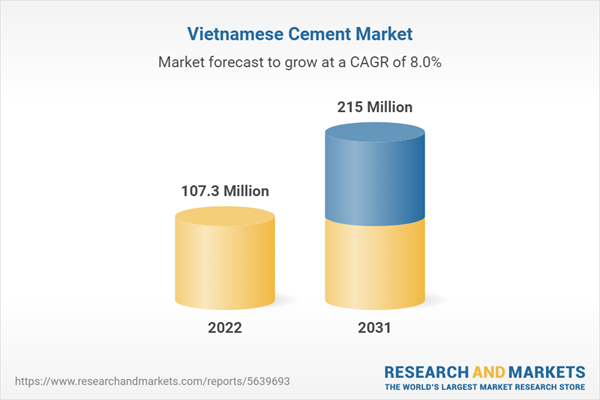Vietnam cement and clinker production volume reached 101.22 million tons in 2021, an increased 1.1% YOY.
According to the analysis, compared to China or other developed countries, low labor cost is one of advantage of Vietnam cement industry. Besides, Vietnam possesses rich ore resources, which are raw materials of cement. The production cost of cement is mainly influenced by coal price.
Construction of infrastructure and booming property industry contributed to increasing domestic consumption of cement in Vietnam in recent years. Several large infrastructure projects are also underway. However, urbanization rate of Vietnam is still very low, only less than 40.4% by the end of 2021, which means the consumption of cement is not currently at the peak.
Cement designed capacity in Vietnam is expected to surge in the next three to five years thanks to aggressive expansion of local manufacturers including Tan Thang, Vissai, and Xuan Thanh. In conclusion, Vietnam is expected to face with continuous supply surplus before reaching equilibrium. In other words, export volume of cement is estimated to keep rising in the future.
According to the analysis, Vietnam’s cement production will maintain growth from 2022 to 2031. The drivers of rising cement production volume in Vietnam include (1) the rising demand for cement in the domestic market with the development of Vietnam's real estate industry and infrastructure (2) the export volume will also grow year by year due to the low-price level of cement in Vietnam.
Topics covered:
- Overview of Vietnam's Cement Industry
- Economic and Policy Environment of Vietnam’s Cement Industry
- What is the impact of COVID-19 on the Cement industry in Vietnam?
- Vietnam’s Cement Market Size, 2016-2021
- Import and Export Analysis of Cement in Vietnam
- Analysis of Vietnam's Major Cement Plantation and Processing Enterprises
- Key Drivers and Market Opportunities in Vietnam’s Cement Industry
- What are the key drivers, challenges, and opportunities for Vietnam’s Cement Industry
- during 2022-2031?
- What is the expected revenue of Vietnam’s Cement market during 2022-2031?
- Which segment of Vietnam’s Cement market is expected to dominate the market in 2031?
- What are the major adverse factors facing the Cement industry in Vietnam?
- Forecast on Vietnam’s Cement Market, 2022-2031
Table of Contents
Companies Mentioned
- Vietnam Cement Industry Corporation
- The Vissai Cement Group
- Xuan Thanh Cement Joint Stock Company
- Nghi Son Cement Corporation (NSCC)
- Luks Group (Vietnam Holdings) Co. LTD.
- Tan Thang Cement Joint Stock Company
Methodology
Background research defines the range of products and industries, which proposes the key points of the research. Proper classification will help clients understand the industry and products in the report.
Secondhand material research is a necessary way to push the project into fast progress. The analyst always chooses the data source carefully. Most secondhand data they quote is sourced from an authority in a specific industry or public data source from governments, industrial associations, etc. For some new or niche fields, they also "double-check" data sources and logics before they show them to clients.
Primary research is the key to solve questions, which largely influence the research outputs. The analyst may use methods like mathematics, logical reasoning, scenario thinking, to confirm key data and make the data credible.
The data model is an important analysis method. Calculating through data models with different factors weights can guarantee the outputs objective.
The analyst optimizes the following methods and steps in executing research projects and also forms many special information gathering and processing methods.
1. Analyze the life cycle of the industry to understand the development phase and space.
2. Grasp the key indexes evaluating the market to position clients in the market and formulate development plans
3. Economic, political, social and cultural factors
4. Competitors like a mirror that reflects the overall market and also market differences.
5. Inside and outside the industry, upstream and downstream of the industry chain, show inner competitions
6. Proper estimation of the future is good guidance for strategic planning.

LOADING...
Table Information
| Report Attribute | Details |
|---|---|
| No. of Pages | 60 |
| Published | July 2022 |
| Forecast Period | 2022 - 2031 |
| Estimated Market Value in 2022 | 107.3 Million |
| Forecasted Market Value by 2031 | 215 Million |
| Compound Annual Growth Rate | 8.0% |
| Regions Covered | Vietnam |
| No. of Companies Mentioned | 6 |









